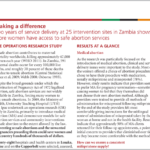
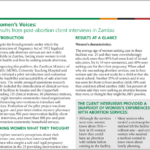
This is a fact sheet highlighting women’s perspectives on abortion care as part of operations research in Zambia.
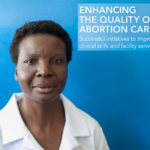
This report looks at initiatives in four countries—Nigeria, Nepal, Ghana and Zambia—where Ipas is working with governments, communities and other partners to provide clinical and programmatic support to providers and health-care facilities.
Abortion is technically legal in Zambia, but the reality is far more complicated. This study describes the process and results of galvanizing access to medical abortion where abortion has been legal for many years, but provision severely limited. It highlights the challenges and successes of scaling up abortion care using implementation science to document two years of implementation. The findings provide a case study of medical abortion introduction in Zambia and offer important lessons for expanding safe and legal abortion access in similar settings across Africa.
Contraception is an essential element of high-quality abortion care. However, women seeking abortion often leave health facilities without receiving contraceptive counselling or methods, increasing their risk of unintended pregnancy. This paper describes contraceptive uptake in 319,385 women seeking abortion in 2,326 public-sector health facilities in eight African and Asian countries. Ministries of Health integrated contraceptive and abortion services, with technical assistance from Ipas. Overall, postabortion contraceptive uptake was 73 percent. The findings demonstrate high contraceptive uptake when it is delivered at the time of the abortion, a wide range of contraceptive commodities is available, and ongoing monitoring of services occurs.
Despite Zambia’s relatively progressive abortion law, women continue to seek unsafe, illegal abortions. Four domains of abortion attitudes – support for legalization, immorality, rights, and access to services – were measured in 4 communities.
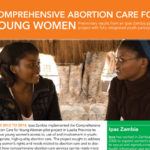
From 2012 to 2014, Ipas Zambia implemented the Comprehensive Abortion Care for Young Women pilot project in Lusaka Province to improve young women’s access to, use of and involvement in youth-appropriate, high-quality abortion care. This brief focuses on the first two objectives of the pilot project, which sought to address young women’s rights and needs related to abortion care and to document how comprehensive abortion care services can be made more appropriate for young women through youth participation in all aspects of the project design, implementation, monitoring and evaluation.
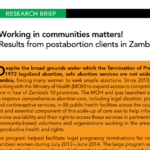
This two-page research brief looks at the results of client exit interviews conducted in 2014 with 616 Zambian women who sought a safe and legal pregnancy termination. The interviews explored issues of quality, service delivery and information dissemination as perceived by the women themselves—a perspective often neglected in reproductive health.
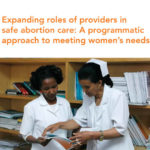
This brief examines the key results from expanding abortion service provision to midlevel providers in 10 Ipas country programs throughout Asia and Africa, including a global analysis of programmatic data from all 10 countries and two case studies (Ethiopia and Bangladesh).


